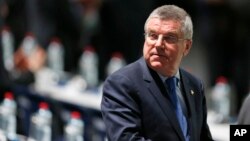In a major change in the handling of positive drug tests at the Olympics, the IOC is set to remove itself from the process and have a group of independent sports arbitrators rule on doping cases during the games in Rio de Janeiro, officials familiar with the plans told The Associated Press.
The change is expected to be approved by the International Olympic Committee's executive board on Tuesday, three officials told the AP. They spoke on condition of anonymity because the plan had not yet been formally adopted.
The move is intended to make the prosecution of doping cases more independent by taking it away from the IOC and putting it in the hands of a special panel of the Court of Arbitration for Sport.
Under current rules, doping cases during the Olympics are dealt with by a special IOC disciplinary panel appointed by the IOC president. The panel schedules hearings with athletes who test positive and decides on sanctions. Most athletes who test positive during the Olympics are disqualified, expelled from the games and stripped of any medals.
Under the new proposal, positive cases would go directly to a small group of specially-appointed CAS arbitrators on site. They would hold hearings and issue rulings without IOC involvement.
Any appeal against the arbitrators' decision would be heard by a separate CAS division, which already handles eligibility and other disputes at the Olympics.
CAS is a Swiss-based body created by the IOC that is considered the highest court in dealing with sports disputes.
The change for the Olympics was studied by CAS and IOC lawyers and came together quickly. It was being submitted for formal approval to the IOC's ruling executive board later Tuesday.
The move is part of IOC President Thomas Bach's efforts to make drug-testing and sanctioning more credible by removing any potential conflicts of interest.
Bach has also recommended that, in the future, all doping sanctions be handed down by CAS, rather than by individual sports bodies.
Olympic leaders agreed last year that drug-testing in general — not just at the games — should be taken out of the hands of sports bodies. Bach has proposed that an independent testing agency under WADA control be put into place before the 2018 Winter Games in Pyeongchang, South Korea. WADA is still studying the proposal and how to fund it.
"We are convinced that the adoption of these proposals would lead to a more efficient, more transparent, more streamlined, more cost efficient, more harmonized anti-doping system," Bach said late last year. "It would better protect the clean athletes and enhance the credibility of sports."




